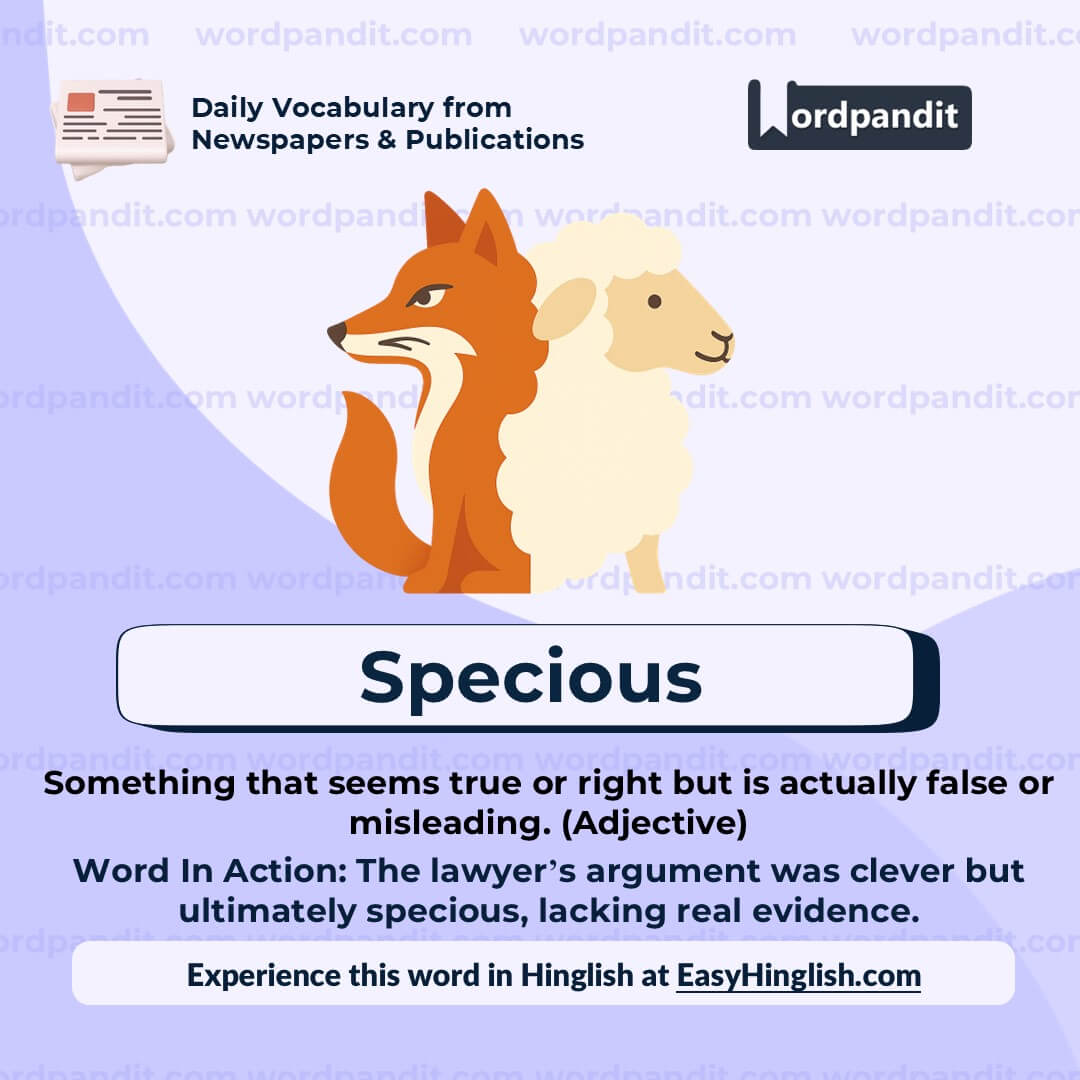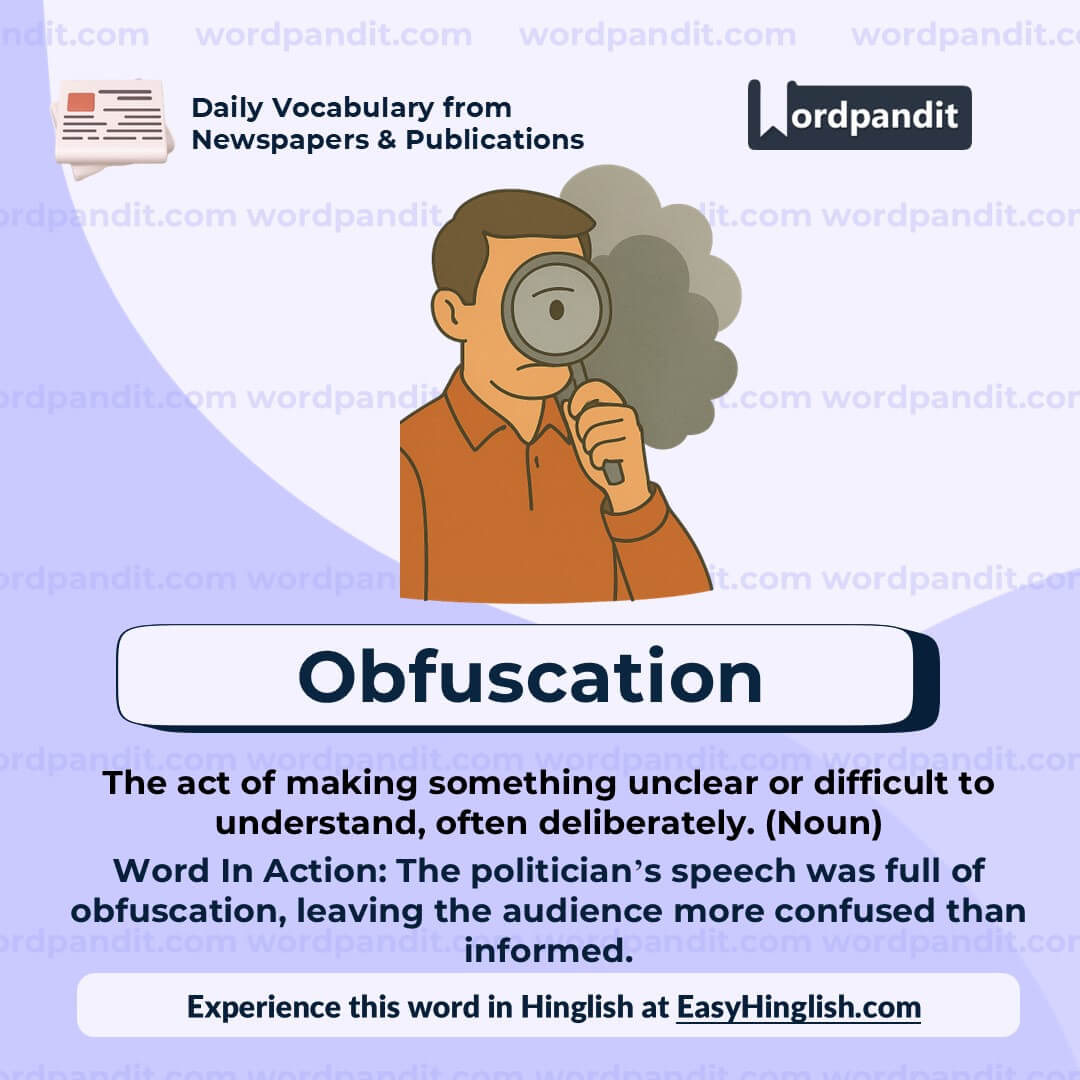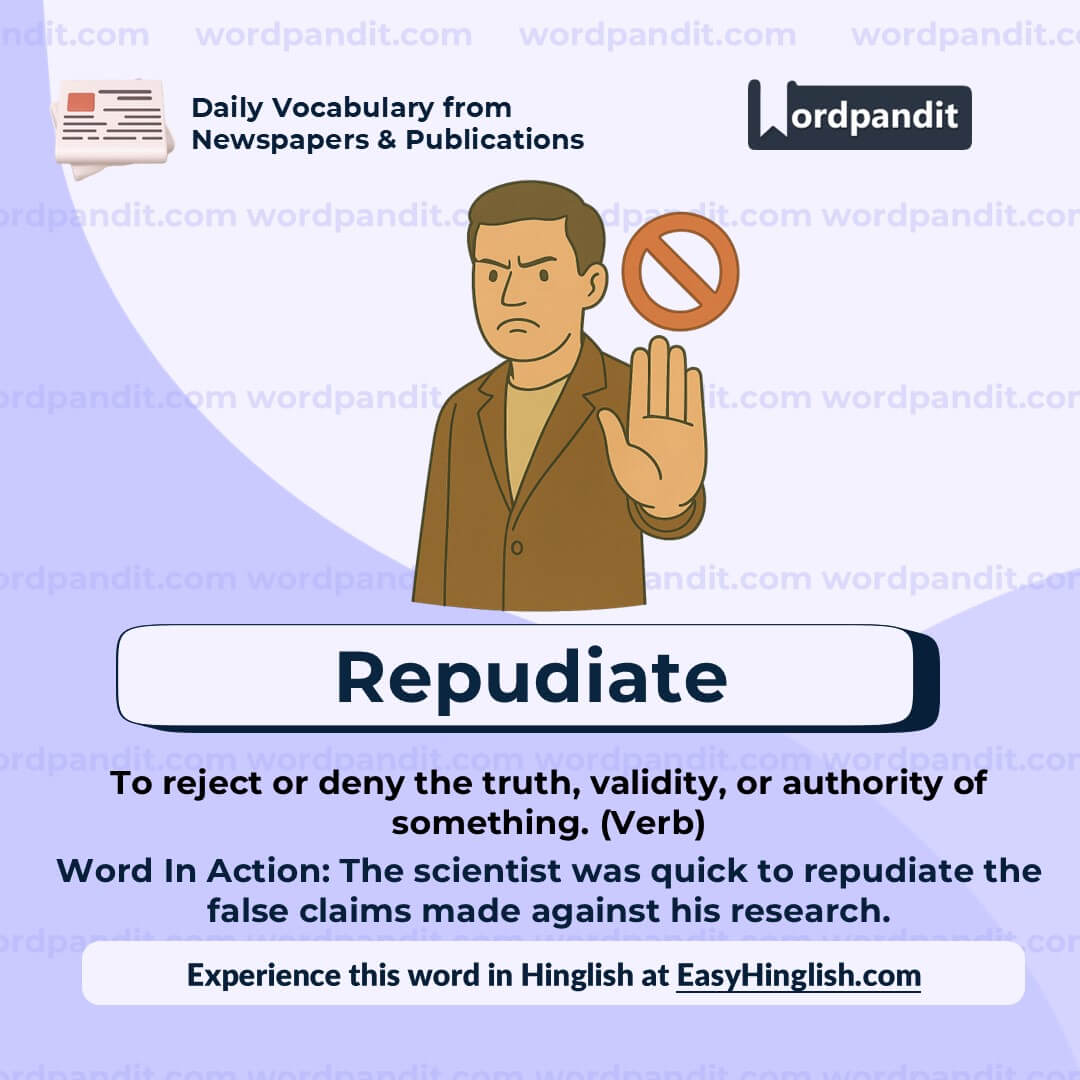Daily Vocabulary from Indian Newspapers and Publications
Welcome to Wordpandit’s Indian Vocabulary Hub
At Wordpandit, we understand the importance of staying rooted in the local context while expanding your language skills. This section focuses on enriching your vocabulary with words and phrases drawn from India’s leading newspapers and publications, ensuring you're learning vocabulary that is practical, relevant, and uniquely Indian.
Why Indian Sources Matter
We believe that the best way to master any language is by immersing yourself in local content. That’s why we carefully curate vocabulary from top Indian publications, including:
- The Hindu
- The Times of India
- The Economic Times
- Hindustan Times
- Live Mint
- The Indian Express
- And many others...
Stay Updated, Stay Relevant
With daily updates from Indian news sources, you’ll be consistently learning words that reflect the trends and shifts in Indian society and culture. Our focus is to provide vocabulary that enhances your understanding of the language in an Indian context.
How Wordpandit Supports Your Goals
Whether you’re preparing for exams, aiming to improve your professional communication, or simply want to stay connected with the latest Indian vocabulary, Wordpandit is here to guide you every step of the way.
Learn with a Practical Approach
Our interactive learning methodology includes real-world examples, engaging activities, and context-specific usage to ensure that every word becomes part of your active vocabulary.
Dive into Indian Vocabulary Today!
Why Choose Wordpandit?
Practical Learning: Focus on words you'll actually encounter in real-world reading, enhancing your comprehension and communication skills.
Diverse Content: From current affairs to scientific breakthroughs, our varied sources expose you to vocabulary across multiple domains.
Effortless Integration: Make Wordpandit a part of your daily routine. Just a few minutes each day can significantly boost your lexicon over time.
Your Path to Vocabulary Mastery
- Visit our Daily Vocabulary section regularly
- Explore new words and their usage in context
- Practice incorporating these words into your own writing and speech
- Track your progress as your vocabulary expands
Start Your Journey Today
Embark on your vocabulary enhancement journey with Wordpandit. By consistently engaging with our daily posts, you'll build a robust vocabulary that serves you well in academic, professional, and personal contexts.
Remember, a word a day keeps linguistic limitations at bay. Make Wordpandit your daily companion in the quest for vocabulary excellence!
WORD-1: Sanguine
Context:
"Despite market volatility, investors remain sanguine about India's long-term economic growth prospects." - Business Standard
Explanatory Paragraph:
The word "sanguine" refers to a hopeful or optimistic outlook, especially in a situation that might not seem very promising to others. When someone is described as sanguine, they tend to expect positive outcomes even in the face of challenges or uncertainty. It's a term often used to describe confidence that is grounded in long-term belief or faith, rather than immediate facts.
Meaning: Optimistic or hopeful, especially in a seemingly difficult situation (Adjective)
Pronunciation: SAN-gwin
Difficulty Level: ⭐⭐⭐ Intermediate
Etymology: From Latin sanguineus, meaning "of blood" — originally associated with a cheerful or ruddy temperament, as per medieval humoral theory.
Prashant Sir's Notes:
Sanguine often appears in economic, political, and strategic contexts to describe a calm but confident attitude toward future developments. It’s important not to confuse it with words like “serene” or “naive optimism.” It implies rational, hopeful confidence.
Synonyms & Antonyms:
Synonyms: optimistic, hopeful, confident, upbeat, positive
Antonyms: pessimistic, doubtful, gloomy, negative, cynical
Usage Examples:
- She remained sanguine about her chances of winning the scholarship despite stiff competition.
- Even in the midst of political chaos, the prime minister appeared sanguine during the press conference.
- Economists are sanguine about a rebound in GDP in the next fiscal year.
- His sanguine attitude helped boost the morale of the entire team.
Cultural Reference:
"In Shakespeare's time, being 'sanguine' referred not just to mood, but to a whole personality type thought to be cheerful and confident — one of the four humors." - Literary Histories
Think About It:
Can being overly sanguine sometimes prevent us from preparing for potential risks or challenges? Where is the line between optimism and denial?
Quick Activity:
Write a short paragraph (3–4 lines) about a difficult situation where someone maintained a sanguine attitude. Try using the word "sanguine" naturally within your paragraph.
Memory Tip:
Think of "SANG" (as in a cheerful song) + "WIN" = someone who sings and believes they’ll win — always optimistic!
Real-World Application:
In business, being sanguine is a valued trait, especially for leaders and entrepreneurs who must remain hopeful and forward-looking even during economic downturns or startup struggles.
WORD-2: Specious
Context:
"The court dismissed the defendant's arguments as specious, noting several logical contradictions in the testimony." - Bar and Bench
Explanatory Paragraph:
"Specious" refers to something that appears true, valid, or genuine on the surface but is actually misleading or false. It is often used to describe arguments, reasoning, or ideas that seem convincing at first glance but crumble under scrutiny. The word warns against being deceived by things that look good or logical but are actually flawed.
Meaning: Seemingly plausible or true, but actually wrong or deceptive (Adjective)
Pronunciation: SPEE-shus
Difficulty Level: ⭐⭐⭐⭐ Advanced
Etymology: From Latin speciosus, meaning "beautiful" or "plausible," from species (appearance or form).
Prashant Sir's Notes:
"Specious" is often used in legal, political, or philosophical debates. It's important to recognize that something specious isn't obviously false—it’s dangerous because it can *seem* convincing. Always look beneath the surface of an argument!
Synonyms & Antonyms:
Synonyms: deceptive, misleading, fallacious, illusory, superficial
Antonyms: genuine, valid, truthful, sound, honest
Usage Examples:
- The politician’s promises were dismissed as specious by critics who had heard them all before.
- Her specious reasoning almost convinced the jury until the facts were re-examined.
- Many online scams use specious tactics to appear legitimate.
- He presented a specious argument in favor of censorship, cloaked in concern for public morality.
Cultural Reference:
"In George Orwell’s *1984*, the ruling party often relied on specious reasoning to justify its actions, blurring the line between truth and manipulation." - Literary Critique Journal
Think About It:
How can we train ourselves to recognize specious arguments in everyday life, especially in the age of social media and fast news?
Quick Activity:
Think of a recent commercial or political advertisement you saw. Try to identify whether any part of it involved a specious claim. Write down why it seemed convincing at first, and how it turned out to be misleading.
Memory Tip:
Think: “*Special + suspicious*” — It looks special, but it’s suspiciously false underneath. That’s specious!
Real-World Application:
In legal settings, identifying specious arguments is vital for ensuring justice. Lawyers, judges, and juries must carefully analyze claims that sound logical but may be built on false premises.
WORD-3: Obfuscation
Context:
"The report accused the ministry of deliberate obfuscation in its presentation of pollution data from industrial zones." - Down To Earth
Explanatory Paragraph:
"Obfuscation" refers to the act of making something unclear, confusing, or difficult to understand—often on purpose. It’s typically used when someone is trying to hide the truth or avoid giving a clear answer by using overly complex language or burying facts. This word often appears in contexts involving politics, bureaucracy, or any setting where transparency is lacking.
Meaning: The act of making something obscure, unclear, or unintelligible (Noun)
Pronunciation: ob-fuh-SKAY-shun
Difficulty Level: ⭐⭐⭐⭐ Advanced
Etymology: From Late Latin obfuscare, meaning “to darken,” which combines ob- (over) + fuscus (dark).
Prashant Sir's Notes:
Use "obfuscation" when you're talking about deliberate confusion, especially in communication. It’s not just about being unclear—it’s about being unclear *on purpose*. It's a favorite word when discussing dodgy PR, politics, or evasive speeches.
Synonyms & Antonyms:
Synonyms: confusion, obscuring, vagueness, ambiguity, clouding
Antonyms: clarity, transparency, lucidity, straightforwardness
Usage Examples:
- The CEO’s explanation was full of technical jargon, leading to accusations of intentional obfuscation.
- Obfuscation of facts in official documents is a serious concern in democratic governance.
- The student's answer was an obvious obfuscation, designed to dodge the real question.
- Legal language is often criticized for its obfuscation, making laws difficult for the public to understand.
Cultural Reference:
"In George Orwell’s *Politics and the English Language*, he criticizes the obfuscation in political writing, urging for clearer, more honest communication." - Modern Language Review
Think About It:
Why might people or institutions choose obfuscation over honesty, even when clarity would build trust?
Quick Activity:
Rewrite the following sentence in a clear, straightforward way to eliminate obfuscation: “Due to unforeseen operational anomalies, service delivery has encountered deviations.”
Memory Tip:
Think: “Obscure + Confuse = Obfuscate.” Obfuscation is like throwing a fog over the facts to keep people in the dark.
Real-World Application:
In media literacy and critical thinking, spotting obfuscation is crucial. Whether you're reading news, advertisements, or official statements, being able to see through unclear language helps protect against manipulation.
WORD-4: Reticent
Context:
"Typically outspoken on policy matters, the minister has been uncharacteristically reticent regarding the controversial legislation." - The Print
Explanatory Paragraph:
"Reticent" describes someone who is reserved or reluctant to speak, especially about their thoughts or feelings. It doesn’t necessarily mean shy, but rather purposeful quietness or discretion. In many contexts, reticence may stem from caution, diplomacy, or a desire to avoid controversy. It’s often used in political or emotional situations where silence or restraint is strategic or telling.
Meaning: Reserved, quiet, or unwilling to speak freely (Adjective)
Pronunciation: RET-uh-sent
Difficulty Level: ⭐⭐⭐ Intermediate
Etymology: From Latin reticens, present participle of reticēre, meaning “to keep silent.”
Prashant Sir's Notes:
"Reticent" is often confused with "reluctant," but while reluctant means unwilling to do something, reticent specifically refers to holding back from speaking or expressing oneself. It’s a great word for describing someone who chooses silence over noise.
Synonyms & Antonyms:
Synonyms: reserved, tight-lipped, silent, restrained, taciturn
Antonyms: talkative, outspoken, communicative, candid, loquacious
Usage Examples:
- She remained reticent during the meeting, choosing to listen rather than speak.
- The witness was oddly reticent when questioned about his whereabouts.
- Despite their close friendship, he was reticent about sharing details of his personal life.
- His reticent demeanor only fueled speculation about the decision.
Cultural Reference:
"In many classic detective stories, the most reticent characters often hide the deepest secrets—think of Holmes's quietly calculating suspects." - Mystery Writers Digest
Think About It:
Can reticence be a strength in leadership or public life? When is silence more powerful than speech?
Quick Activity:
Think of a famous personality known for being reticent. Write 2–3 lines explaining how their quiet nature has impacted public perception.
Memory Tip:
RETICENT sounds like “reluctant to talk” — remember it as someone who *retires* from speaking.
Real-World Application:
In job interviews, being too reticent can be seen as a lack of enthusiasm or confidence. It’s useful to balance humility and silence with clear self-expression.
WORD-5: Repudiate
Context:
"The party was quick to repudiate the unauthorized statement made by a junior member that contradicted its official position." - Hindustan Times
Explanatory Paragraph:
"Repudiate" means to reject something strongly, especially an idea, a statement, a claim, or a person. It often involves a public denial or disowning of responsibility, connection, or endorsement. This word is especially powerful in formal, legal, or political contexts where disassociation must be made clearly and forcefully.
Meaning: To reject, deny, or disown something publicly and emphatically (Verb)
Pronunciation: ri-PYOO-dee-ate
Difficulty Level: ⭐⭐⭐ Intermediate
Etymology: From Latin repudiare, meaning “to cast off, reject,” from repudium (divorce or rejection).
Prashant Sir's Notes:
Repudiate is often used in official or public contexts—when an organization, leader, or country must take a stand and distance itself from something. Don’t confuse it with “refute” (which means to prove something wrong); repudiate is about rejection or disowning.
Synonyms & Antonyms:
Synonyms: reject, disown, renounce, disclaim, deny
Antonyms: accept, embrace, endorse, acknowledge, affirm
Usage Examples:
- The scientist was quick to repudiate any connection with the controversial theory.
- He publicly repudiated the views expressed in the leaked email.
- Countries around the world repudiated the use of chemical weapons in warfare.
- The company repudiated the employee’s remarks as personal and not reflective of its values.
Cultural Reference:
"In the post-Watergate era, American leaders were forced to repudiate Nixon’s tactics and rebuild public trust." - Historical Perspectives Journal
Think About It:
Why might a person or institution choose to repudiate something publicly rather than simply staying silent about it?
Quick Activity:
Imagine you're the spokesperson for an organization. Write 2–3 lines of a press release repudiating a false rumor spreading online about your group.
Memory Tip:
Think: "RE" (again) + "PUSH" — You push it away again and again. That’s what you do when you repudiate something!
Real-World Application:
Repudiation plays a vital role in public relations, politics, and diplomacy. When misinformation spreads, clear repudiation helps set the record straight and maintain credibility.



















